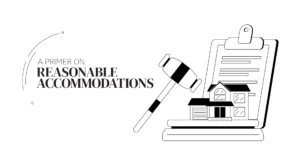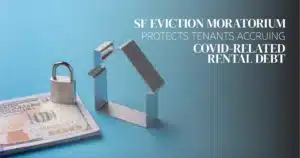Imagine being unable to live in your dream apartment. Not because you can’t afford it, but because your landlord refuses to install a simple wheelchair ramp.
For many disabled renters in California, finding a safe and comfortable place to call home is an ongoing struggle.
Your home is a safe space. It should not feel like a battle, but for many renters with disabilities, it is. This is not only unfair, it is also illegal.
Noteworthy here is that you learn about tenant rights for disabled renters in California so that you can speak up with confidence. Asking for reasonable accommodations is well within your rights, and the landlord should comply with the requests of disabled renters.
Wondering how you can advocate better for your rights as a renter with disabilities? Let’s dive in.
Key Laws Protecting Disabled Renters in California
As a disabled renter, it often feels like the system is stacked against you. But the reality is, the law is on your side.
The Fair Housing Act makes it illegal for landlords to refuse reasonable accommodations. These accommodations include ramps, grab bars, and permission to have a service animal.
Landlords are not doing you any ‘special favors’; these accommodations are your legal rights.
The California Fair Employment and Housing Act (FEHA) protects people with disabilities by extending coverage to more types of housing and addressing even subtle forms of landlord discrimination.
The Americans with Disabilities Act ensures that public and common areas like laundry rooms, parking lots, and leased offices are accessible to disabled individuals.
Tenants must know these laws so that they can find equal access to safe, comfortable housing without discrimination. You should know how to leverage these laws if a landlord refuses to cooperate.
Reasonable Accommodation and Modifications
A perfect apartment for a disabled renter is one where reasonable accommodations are made for them. Parking spaces should be accessible, and ramps should be installed at building entry and exit points. Renters should also be allowed to have service animals even if there’s a ‘no pets’ policy.
A reasonable accommodation can be defined as a modification that allows disabled renters to use and enjoy their home fully.
It is illegal for a landlord to deny reasonable accommodations unless they cause an ‘undue burden’. This means that the accommodations can fundamentally change the business or cost an unreasonable amount.
An example of an undue burden would be remodeling the entire bathroom, whereas a reasonable accommodation would be adding a grab bar in the bathroom.
Remember: Any accommodation you request should be in writing. This includes the details of what you need and why you need it. This is necessary documentation that will protect you legally and give the landlord a chance to respond properly.
Landlord Responsibilities and Tenant Protections
When you are apartment hunting, you are not just looking for a place to stay; you are also looking for a landlord who treats you well. This is what makes the whole process so stressful.
Under California law, landlords have clear duties to ensure renters live in a safe and habitable environment. Here’s what responsibilities look like for disabled tenants:
Provide Equal Access to Housing
The primary responsibility of the landlord is to give disabled renters an equal chance to apply for the apartment as any other tenant.
Maintain Accessibility and Make Repairs
It is the landlord’s responsibility to provide accommodations that allow disabled renters to enter and exit the building easily. For example, elevators should be installed, and if the elevator breaks, the landlord must fix it promptly.
Another example of accommodations is installing a ramp. This is not just optional. If the tenant is disabled, these accommodations are a legal requirement.
No Extra Fee or Deposits
Your landlord cannot ask you to put down a deposit for installing a ramp or charge you a fine for having a service animal. These accommodations are to be covered by the landlord. Asking for a ‘special fee’ of any kind for disability related accommodations is illegal.
Eviction Protection and Harassment Prevention
While it is illegal to evict someone because they are disabled in California, they are unfortunately more susceptible to eviction than other tenants. This puts people with disabilities in a vicious cycle of poverty and poor health.
What does an illegal eviction look like? Here are some examples:
- Eviction notice served after you request accommodation, such as a grab bar or a service animal.
- Giving you notice to leave as punishment for filing a complaint or reporting unsafe conditions. This is retaliation.
- Harassing you to allow constant inspection, threats, or disruptive behavior, all with the intention to force you out.
Steps to Take if Your Rights Are Violated
If you suspect that your rights are being violated, you must document the situation and act quickly.
Dealing with harassment or retaliation is difficult, and you don’t have to go through it alone. Contact a tenant’s rights team, such as The Law Firm for Tenant Rights, Inc.. Our expert tenant rights attorneys step in to protect you from eviction, fight for fair treatment, and pursue representation on your behalf if your rights were violated.
Ready to hold your landlord accountable? Contact our firm today for a free consultation.
Frequently Asked Questions
- What are tenant rights for disabled renters in California?
Disabled renters have the right to equal access to housing. This means reasonable accommodation and protection from discrimination.
- What laws protect disabled renters in California?
The Fair Housing Act and ADA protect renters from housing discrimination.
- What counts as a reasonable accommodation?
Reasonable accommodations may include allowing service animals, providing accessible parking, or installing ramps.
- Can my landlord refuse my service animal?
No, a landlord cannot refuse service animals, even if the building in question is a ‘no-pet’ building.
- Do landlords have to pay for disability-related modifications?
Yes, in most cases, the landlords have to pay for any reasonable modification requested by the tenants.
- What are the landlord’s responsibilities for disabled tenants in California?
Landlords are responsible for providing equal access to safe housing, and they cannot charge extra fees to do so.
- Can a disabled tenant be evicted?
Yes, a disabled tenant can be evicted, but not due to disability or in retaliation for requesting accommodations.
- What should I do if my landlord harasses me?
If your landlord harasses you, you can send a written complaint and contact a tenant rights lawyer to take legal action on your behalf.
- How do I file a housing discrimination complaint in California?
You can file a housing discrimination complaint by filing with the California Civil Rights Department (CRD) or the HUD’s Fair Housing Portal.
- When should I contact a tenant rights lawyer?
You should contact a tenant rights lawyer as soon as you face retaliation, harassment, or an unlawful eviction notice.





